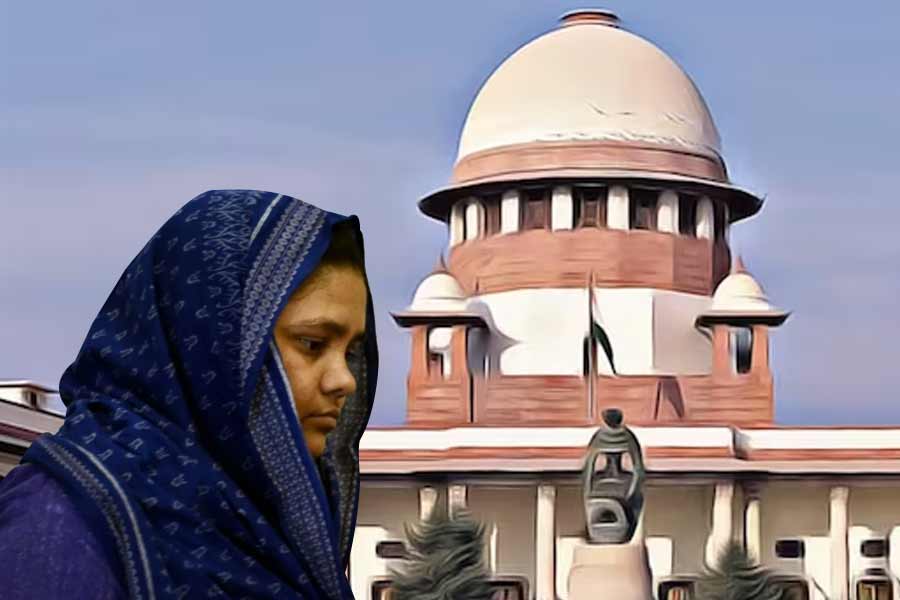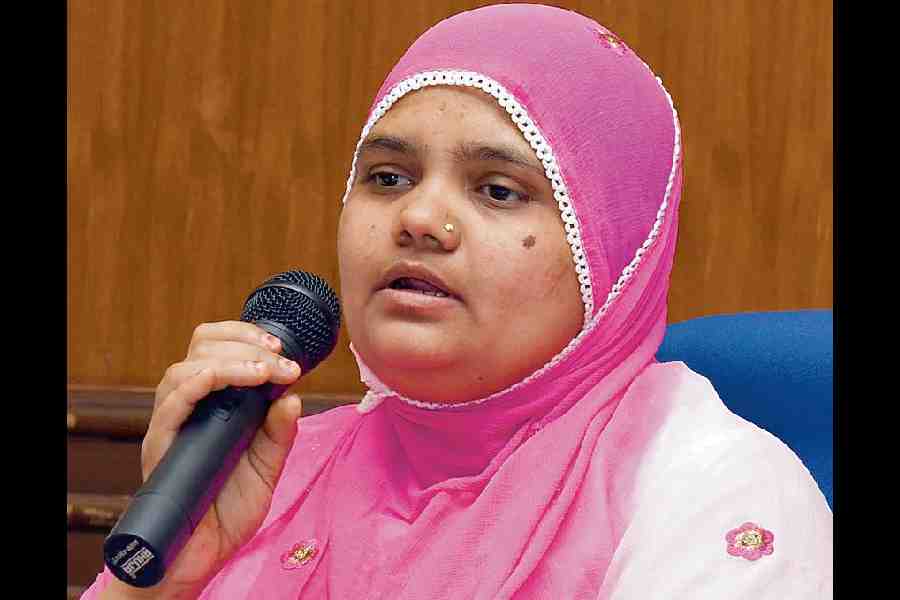Accusing the Gujarat government of abusing its power, the Supreme Court on Monday quashed the remission to 11 men convicted of gangraping Bilkis Bano and murdering seven of her family members during the 2002 riots and ordered that they be sent back to jail within two weeks.
The Gujarat government's remission order was without application of mind, a bench of Justices B V Nagarathna and Ujjal Bhuyan said and asked whether "heinous crimes against women permit remission" whatever faith she may follow or creed she may belong to.
Bilkis Bano was 21 years old and five months pregnant when she was raped while fleeing the horror of the communal riots that broke out after the Godhra train burning incident in February 2002. Her three-year-old daughter was among the seven family members killed.
All 11 convicts were granted remission by the Gujarat government and released on August 15, 2022. "We strike down the remission orders on the ground of usurpation of power by Gujarat government," the bench said.
In its more than 100-page judgment, the Supreme Court said the Gujarat government was not the appropriate government to pass the remission order. It clarified that the state in which an offender is tried and sentenced is competent to decide the remission plea of convicts. The convicts were tried in Maharashtra.
"We need not have gone into the other issues. But for sake of completion, we have. Rule of law is breached because the Gujarat government usurped power not vested in it and abused its power. On that ground also, the remission orders deserve to be quashed," the bench said.
The top court also nullified its May 13, 2022 order of another bench asking the Gujarat government to consider a remission plea of one of the convicts as the order was obtained by "playing fraud on the court" and by suppressing material facts.
It said this is a classic case where the order of this court was used to violate the rule of law by granting remission.
Reacting to the verdict, senior advocate Vrinda Grover, who appeared for retired IPS officer Meeran Chadha Borwankar and others, termed it a very good judgement.
"... (it) has upheld the rule of law and the faith of the people of this country, particularly women, in the legal system, the courts, and that there is an assurance for justice," Grover told reporters.
Coming down heavily on the Gujarat government for not filing a review plea against the May 2022 judgment, the Supreme Court said only the state of Maharashtra could have passed the remission orders.
"Taking advantage of May 13, 2022 order of this court, other convicts also filed remission applications... Gujarat was complicit and acted in tandem with respondent no. 3 (one of the convicts) in this case. This Court was misled by suppressing facts," the bench said.
The top court also held that the PIL contesting the remission filed by Bilkis Bano under Article 32 of the Constitution was maintainable. The question of the maintainability of the PILs does not call for an answer, being rendered academic and is left open in an appropriate case. According to Article 32, "It is a fundamental right, which states that individuals have the right to approach the Supreme Court (SC) seeking enforcement of other fundamental rights recognised by the Constitution." Quoting Greek philosopher Plato extensively, Justice Nagarathna said, "Punishment is to be inflicted not for the sake of vengeance for what is done cannot be undone but for the sake of prevention and reformation." "In his treatise, Plato reasons that the lawgiver, as far as he can, ought to imitate the doctor who does not apply his drug with a view to pain only, but to do the patient good. This curative theory of punishment likens penalty to medicine administered for the sake of the good of one being chastised. Thus, she said, if a criminal is curable, he ought to be improved by education and other suitable arts and then set free as a better citizen and less of a burden to the state.
"This postulate lies at the heart of the policy of remission," she said.
Observing that the victim's rights also important, Justice Nagarathna said a "woman deserves respect howsoever high or low she may be considered in society or to whatever faith she may follow or any creed she may belong to".
"Can heinous crimes against women permit remission? These are the issues which arise," she said.
On October 12 last year, the apex court reserved its verdict after an 11-day hearing on the petitions, including the one filed by Bilkis Bano.
While reserving the judgement, the apex court had directed the Centre and the Gujarat government to submit by October 16 the original records related to the remission of sentence of the 11 convicts.
Besides the petition filed by Bilkis Bano, several other PILs, including one by CPI(M) leader Subhashini Ali, independent journalist Revati Laul and former vice-chancellor of Lucknow University Roop Rekha Verma and another by TMC leader Mahua Moitra, challenged the remission of the convicts and their premature release from jail.











